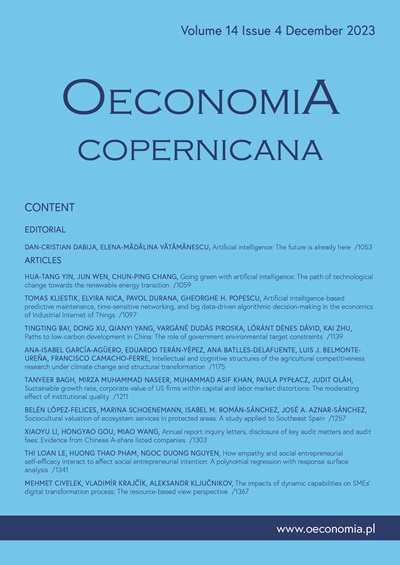Study of legislative and administrative obstacles to SMEs business in the Czech Republic and Slovakia
IF 10.8
1区 经济学
Q1 ECONOMICS
引用次数: 35
Abstract
Research background: SMEs represent an integral part of the economy environment in a majority of the countries all over the world. They signify the most efficient, progressive, and important part of the advanced economies. The long-term effort of the EU countries, as well as other advanced economies is to create quality and stable conditions for their development in order to be able to respond to all the possible changes in the business environment that is being changed to more and more comprehensive in the recent time. Purpose of the article: The objective of the contribution is to examine administrative and legislative obstacles to SMEs business in the Czech Republic and Slovakia and the quantification of the differences in perceiving legislative and administrative obstacles to business by entrepreneurs in both countries. Methods: A questionnaire survey was conducted within SMEs in the Czech Republic and Slovakia in 2019. The research sample included 641 SMEs, 312 from the Czech Republic and 329 from Slovakia. We focused on 5 dimensions related to legislative and administrative obstacles to SMEs business within which selected statements were examined. Contingency tables were used to analyze the ratios of the examined variables. Findings & Value added: The differences detected in both countries in the respondents´ perception and assessment are evidence of the changes in the business environment of both countries, giving rise to the questions about the extent to which the legislative and administrative obstacles, as well as the obstacles related to law enforcement and bureaucracy are acceptable and by which groups of entrepreneurs. The results of the research provide valuable findings for the creators of regional and national policies, and represent a valuable basis for the creation of the concepts focused on the SMEs´ development in both countries. The results of the study also support the implementation of follow-up research in this area that will reveal other determinants affecting the development of SMEs. They also create a valuable platform for the construction of national and international benchmarking indicators in this area and the implementation of comparative analyses. This will also support the methodological area necessary for a creation of high-quality concepts and strategies.捷克共和国和斯洛伐克中小企业经营的立法和行政障碍研究
研究背景:在世界上大多数国家,中小企业是经济环境不可分割的一部分。它们代表着发达经济体中最有效、最先进和最重要的部分。欧盟国家以及其他发达经济体的长期努力是为其发展创造高质量和稳定的条件,以便能够应对最近越来越全面的商业环境中所有可能发生的变化。文章的目的:贡献的目的是审查捷克共和国和斯洛伐克中小企业经营的行政和立法障碍,以及量化两国企业家对商业的立法和行政障碍的感知差异。方法:2019年对捷克和斯洛伐克中小企业进行问卷调查。研究样本包括641家中小企业,其中312家来自捷克共和国,329家来自斯洛伐克。我们重点研究了与中小企业经营的立法和行政障碍有关的5个方面,并在这些方面对选定的陈述进行了审查。列联表用于分析被检查变量的比率。调查结果与附加值:两国受访者在感知和评估方面所发现的差异,证明了两国商业环境的变化,这引发了以下问题:立法和行政障碍以及与执法和官僚主义相关的障碍在多大程度上是可以接受的,以及哪些企业家群体可以接受。研究结果为区域和国家政策的制定者提供了宝贵的发现,并为两国中小企业发展概念的创造提供了宝贵的基础。研究结果也支持在这一领域开展后续研究,以揭示影响中小企业发展的其他决定因素。它们还为构建这一领域的国家和国际基准指标和实施比较分析创造了宝贵的平台。这也将支持创建高质量概念和战略所必需的方法学领域。
本文章由计算机程序翻译,如有差异,请以英文原文为准。
求助全文
约1分钟内获得全文
求助全文
来源期刊

Oeconomia Copernicana
ECONOMICS-
CiteScore
13.70
自引率
5.90%
发文量
26
审稿时长
24 weeks
期刊介绍:
The Oeconomia Copernicana is an academic quarterly journal aimed at academicians, economic policymakers, and students studying finance, accounting, management, and economics. It publishes academic articles on contemporary issues in economics, finance, banking, accounting, and management from various research perspectives. The journal's mission is to publish advanced theoretical and empirical research that contributes to the development of these disciplines and has practical relevance. The journal encourages the use of various research methods, including falsification of conventional understanding, theory building through inductive or qualitative research, first empirical testing of theories, meta-analysis with theoretical implications, constructive replication, and a combination of qualitative, quantitative, field, laboratory, and meta-analytic approaches. While the journal prioritizes comprehensive manuscripts that include methodological-based theoretical and empirical research with implications for policymaking, it also welcomes submissions focused solely on theory or methodology.
 求助内容:
求助内容: 应助结果提醒方式:
应助结果提醒方式:


